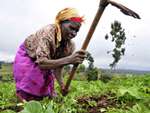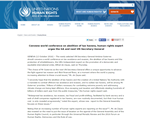Published on Fri, 2016-10-28 21:58
That question guided the debate during the launch of the the “Spotlight on Sustainable Report” report at the Palais des Nations, headquarters of the United Nations in Geneva, last October 24. Independent monitoring and review of the implementation of the 2030 Agenda and its structural obstacles and challenges are key factors for the success of the SDGs. For this reason, a global alliance of civil society organizations and networks comprising of Arab NGO Network for Development (ANND), Development Alternatives with Women for a New Era (DAWN), Social Watch, Third World Network (TWN) and Global Policy Forum (GPF) with the support of the Friedrich-Ebert-Stiftung (FES) produced a Spotlight Report assessing the implementation of the 2030 Agenda and the structural obstacles in its realization. |
Published on Thu, 2016-10-20 13:20
In a joint side event with other Civil Society Organizations we will assess the state of corporate influence in the business and human rights debates, in global health, the agriculture, food and nutrition policy domains. We will discuss possible policies and safeguards such as WHO’s Framework of Engagement with non-State Actors (FENSA) and the Framework Convention on Tobacco Control that have been put in place to protect against conflicts of interest in these respective domains. We will also inform about further debates to regulate the UN’s engagement with private actors such as the discussions in the Quadrennial Comprehensive Policy Review (QCPR). |
Published on Thu, 2016-10-20 10:20
A letter for governments regarding the need for an intergovernmental tax body to be established under the United Nations. The aim of this letter is to support the forces trying to bring this issue back on the agenda, and get as many countries as possible to speak out in favor. Ecuador has recently supported the idea of establishing a global UN tax body, and this creates new opportunities. However, this is not a "support Ecuador"-campaign, but rather an attempt to use the opportunity to get many more governments to speak out in favor of establishing an intergovernmental tax body. This is an effort to promote the creation of a Global Tax Body within the United Nations. Such an international tax body would help fight corruption and tax evasion and thus make more resources available for health, education and social services. |
Published on Fri, 2016-10-14 19:41
Current debates in Ghana about sustainable development express a confluence of four important trends: 1) questioning of the growing inequalities and exclusion wrought by the dominant neoliberal economic policies and the quality of growth that has resulted; 2) recognition of the advances that the 2030 Agenda for Sustainable Development and its 17 Sustainable Goals (SDGs) represent on the minimal ambitions of the Millennium Development Goals (MDGs); 3) African recognition of the limits of raw material commodity export dependence and the need for structural economic transformation; and 4) the rediscovery of development planning as an important tool and policy framework. |
Published on Fri, 2016-10-14 18:06
A United Nations human rights expert has called on newly elected United Nations Secretary-General (UNSG) Antonio Guterres to convene a world conference to discuss the issues of tax avoidance and evasion, the abolition of tax havens as well as the protection of whistleblowers. In a UN news release, the Independent Expert on the promotion of a democratic and equitable international order, Mr Alfred de Zayas (United States), said: "The choice of Mr Guterres as the next UN Secretary-General offers a unique opportunity to advance the fight against tax evasion and illicit financial flows, at a moment where the world is paying increasing attention to these crucial issues". |
SUSCRIBE TO OUR NEWSLETTER







